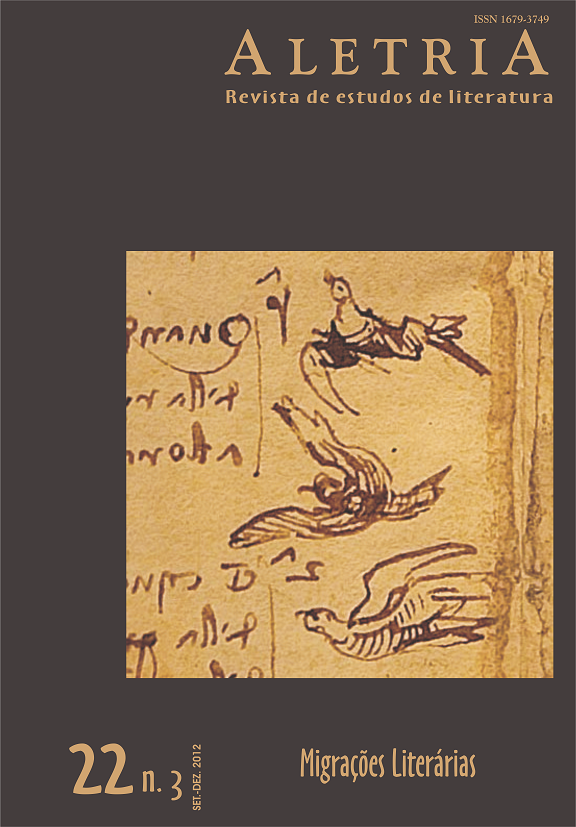Poesía, diáspora y migración: cuatro voces femeninas
DOI:
https://doi.org/10.17851/2317-2096.22.3.161-175Palabras clave:
migración, poesía feminina, diáspora africanaResumen
Este artículo pretende poner en diálogo la producción poética de cuatro autoras afrodescendentes contemporáneas Dionne Brand, Lucille Clifton, Conceição Evaristo y Marie-Célie Agnant), con el objetivo de verificar de cuál manera ellas se acercan y actualizan temáticas caras a la diáspora africana que originó las sociedades donde ellas se formaron. Por otra parte, se desea verificar cómo el proceso migratorio de dos de ellas (Brand y Agant) interfiere en la elaboración de sus universos poéticos, actualizando las cuestiones de la diáspora a partir de las perspectivas globales contemporáneas.
Descargas
Referencias
AGNANT, Marie-Célie. Balafres. Montreal: CIDHICA, 1994.
ALMEIDA, Sandra Regina Goulart. A nova diáspora e a literatura de autoria feminina contemporânea. In: CAVALCANTI, Ildney; LIMA, Ana Cecília; SCHNEIDER, Liane (Org.). Da mulher às mulheres: dialogando sobre literatura, gênero e identidades. Maceió: EDUFAL, 2006. p. 191-199.
BRAND, Dionne. A map to the door of no return: notes to belonging. Toronto: Vintage, 2001.
BRAND, Dionne. Inventory. Toronto: McClelland & Stewart, 2006.
BRYDON, Diana. Dionne Brand’s global intimacies: practising affective citizenship. Quarterly, University Toronto, v. 76, n. 3, p. 990-1006, Summer 2007.
CLIFFORD, James. Diasporas. Cultural Anthropology, v. 9, n. 3, p. 302-338, Aug. 1994.
CLIFTON, Lucille. Blessing the boats: new and selected poems 1988-2000. New York: Boa Editions, 2000.
DAVIES, Carole Boyce. Black, women, writing and identity: migrations of the subject. New York: Routledge, 1994.
DAVIES, Carole Boyce. Mulheres caribenhas escrevem a migração e a diáspora. Estudos Feministas, Florianópolis, v. 18, n. 3, p. 747-630, 2010.
EVARISTO, Conceição. Poemas de recordação e outros movimentos. Belo Horizonte: Nandyala, 2008.
FONSECA, Maria Nazareth Soares. Vozes femininas em afrodicções poéticas: Brasil e África portuguesa. In: PEREIRA, Edimilson de Almeida (Org.). Um tigre na floresta de signos: estudos sobre poesia e demandas sociais no Brasil. Belo Horizonte: Mazza Edições, 2010. p. 285-294.
GIACOMINI, Sonia Maria. Mulher e escrava: uma introdução histórica ao estudo da mulher negra no Brasil. Rio de Janeiro: Vozes, 1988.
GILROY, Paul. O Atlântico negro: modernidade e dupla consciência. Trad. Cid Moreira. Rio de Janeiro: Universidade Cândido Mendes, 2001.
GLISSANT, Édouard. Introdução a uma poética da diversidade. Trad. Enilce Albergaria Rocha. Juiz de Fora: Ed. UFJF, 2005.
GOMES, Heloisa Toller. Visíveis e invisíveis grades: vozes de mulheres na escrita afro- descendente contemporânea. Caderno Espaço Feminino, v. 12, n. 15, ago.-dez. 2004.
HALL, Stuart. Da diáspora: identidades e mediações culturais. Trad. Adelaine La Guardia Resende et al. Belo Horizonte: Ed. UFMG, 2009.
HARRIS, Leila. Em trânsito: o lar da diáspora nos contos de Dionne Brand. In: ALMEIDA, Sandra Regina G.; DINIZ, Dilma Castelo Branco; DOS SANTOS, José (Org.). Migrações teóricas, Interlocuções culturais. Belo Horizonte: Argomentum Editora, 2009. p. 87-96.
HOOKS, Bell. Intelectuais negras. Trad. Marcos Santarrita. Estudos Feministas, ano 3, n. 2, p. 464-478, 1995.
MCKITTRICK, Katherine. Demonic grounds: black women and the cartographies of struggle. Minneapolis: University of Minnesota Press, 2006.
NDIAYE, Pap. La condition noire. Essai sur une minorité française. Paris: Gallimard, 2009.
SPIVAK, Gayatri Chakravotry. Diasporas old and new: women in the transnational world. Textual Practice, p. 245-296, 1996.
SAID, Edward. Reflexões sobre o exílio e outros ensaios. Trad. Pedro Maia Soares. São Paulo: Companhia das Letras, 2001.
SAID, Edward. Representações do intelectual: as conferências Reith de 1993. Trad. Milton Hatoum. São Paulo: Companhia das Letras, 2005, 128 p.
SAFRAN, William. Diasporas in modern societies: myths of homeland and return. Diaspora, v. 1, n. 1, p. 83-99, Spring 1991.
SANTIAGO, Silviano. O cosmopolitismo do pobre. Belo Horizonte: Ed. UFMG, 2004.
SASSEN, Saskia. The global city: New York, London, Tokio. Princeton: Princeton University Press, 2001.
SCOTT, David. That event, this memory: notes on the anthropology of diaspora in the New World. Diaspora, v, 1, n. 3, p. 261-284, 1991.
TILLIS, Antonio. Mulher, negra, caribenha, canadense e lésbica: representando os vários “selves” na poesia de Dionne Brand. In: ALMEIDA, Sandra Regina Goulart; DINIZ, Dilma Castelo Branco; DOS SANTOS, José (Org.). Migrações teóricas, interlocuções culturais. Belo Horizonte: Argumentum Editora, 2009. p. 149-162.
WALCOTT, Rinaldo; SANDERS, Leslie. At the Full and Chane of CanLit: an interview with Dionne Brand. Canadian Women Studies/ Les Cahiers de la Femme, v. 20, n. 2, p. 22- 26, 2000. Disponível em: http:// PI.library.yorku.ca/ojs/índex.php/cws/issue/view/443/showToc. Acesso em: 26 mar. 2011.
WALTER, Roland. Afro-América: diálogos literários na diáspora negra das América. Recife: Coleção & Letras, 2009.
WALTERS, Wendy. At home in diaspora. Minneapolis: University of Minnesota Press, 2005.
Descargas
Publicado
Número
Sección
Licencia
Derechos de autor 2012 Prisca Rita Agustoni de Almeida Pereira (Autor)

Esta obra está bajo una licencia internacional Creative Commons Atribución 4.0.
Authors who publish with this journal agree to the following terms:Authors retain copyright and grant the journal right of first publication with the work simultaneously licensed under a Creative Commons Attribution Non-Commercial No Derivatives License that allows others to share the work with an acknowledgement of the work's authorship and initial publication in this journal.Authors are able to enter into separate, additional contractual arrangements for the non-exclusive distribution of the journal's published version of the work (e.g., post it to an institutional repository or publish it in a book), with an acknowledgement of its initial publication in this journal.Authors are permitted and encouraged to post their work online (e.g., in institutional repositories or on their website) prior to and during the submission process, as it can lead to productive exchanges, as well as earlier and greater citation of published work (See The Effect of Open Access).









